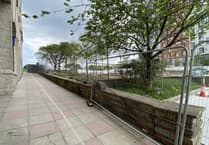NEW trains built using Japanese ’bullet train’ technology are fast approaching Ivybridge, Totnes and South Hams rail routes.
The company says the new fleet will offer Great Western Railway passengers more seats, more space and onboard technology.
Its Italian factory this week received brand new, GWR green bodyshells, heralding the start of work on the 36 Westcountry-bound trains.
From autumn 2017, the first wave of new InterCity Express trains will run on the Great Western main line, connecting London to western cities including Reading, Bath, Bristol and Cardiff. From 2018, a second batch of new trains will begin running as far south as Penzance.
Hitachi says the entire fleet of 93 trains will be in passenger service by the end of 2019.
In a statement, the company said: ’The new fleet harnesses pioneering Japanese bullet train technology known for its quality and reliability. Passengers can expect more seats, better onboard facilities with the possibility of shorter journey times.
’Passengers will also benefit from new onboard technology, including real-time journey updates and seat reservation screens.
’The fleet is fitted with bi-mode technology, allowing trains to use diesel and electric power, meaning even while infrastructure modernisation takes place passengers can enjoy the benefits of the new trains.’
The company also claims: ’The fleet’s design ensures it can withstand the region’s weather conditions, including routes along the Dawlish coast.’
This week it was reported a train from London to Plymouth was forced to terminate at Newton Abbot after its windscreen was smashed by a pebble flung by a huge wave at Dawlish.
Local commentators have broadly welcomed the arrival of the new trains.
Ivybridge rail expert Phillip Dredge said: ’The HSTs [high speed trains], which have done sterling service ferrying passengers between the Westcountry and the capital are now over forty years old and it is time that their replacements were brought into service.
’We are not yet aware of the timetables under which the Hitachi trains will operate but with their up to date specification they should bring quicker journey times and increased capacity. We look forward to seeing them in our area.’
Malcolm Thomson, chairman of the Ivybridge Rail Users Group agreed future timetabling was critical.
He said: ’What we’ve said before is we were worried that we’d lose our direct link to Paddington, but we have been told we’ll continue to get two trains up and two back each weekday. We are supposed to be having a timetable meeting soon, and we’ll be pressing for those trains to continue.
’What we’ve also been asking for for a long time is an earlier train to Exeter than the current 8.25am, which doesn’t get in early enough to go to work for 9am. To have one a bit earlier would be great.
’We’ve also been promised six new local services that would fill in some of the gaps, especially on a Sunday. But as well as keeping the Paddington trains, our first priority is an earlier train to Exeter.
’We are looking forward to the Hitachi trains being a bit faster, depending on the number of stops of course, and they should be more comfortable, although we’ll judge that when they come in. We know they won’t have a buffet car, it’ll be a trolley service, so we’ll see how that turns out.
’But all in all we are looking forward to the new trains.’
GWR managing director Mark Hopwood said: ’Today marks another significant step towards delivering new trains, more seats, more frequent services and quicker journeys; and a step change in passenger experience on the Great Western. It is great to see work on the fleet for Devon and Cornwall progress.’
Managing director of Hitachi Rail Europe Karen Boswell said: ’Introducing a new bullet train inspired fleet to run along iconic stretches of British railway will be a truly historic moment.
’These new trains will transform passenger experiences, offering a truly 21st century experience with more seats and on-board technology. Additional luggage space and a smoother ride will increase comfort for longer journeys connecting distant parts of the country.’





Comments
This article has no comments yet. Be the first to leave a comment.